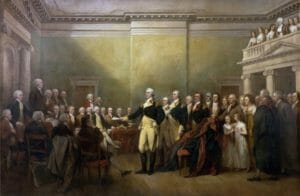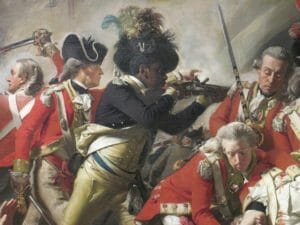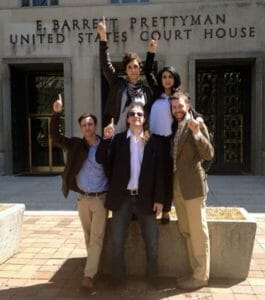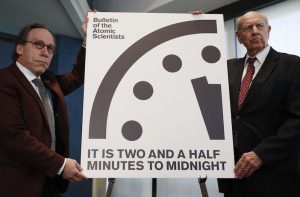A Second Amendment for the 21st Century
James Madison, who wrote the now hotly contested amendment, no doubt would have a thing or two to say about how it has been interpreted. A couple protest at the March for Our Lives rally in Denton, Texas. (Heather Mount / Unsplash)
A couple protest at the March for Our Lives rally in Denton, Texas. (Heather Mount / Unsplash)
Guns don’t shoot people. People shoot people. That’s what some people say. But there are exceptions.
In 2015, for example, CNN reported on Allie Carter, who was hunting in northern Indiana with her dog when she laid her 12-gauge shotgun on the ground. Her chocolate lab stepped on it and shot her in the foot. The name of the dog was Trigger.
Clearly, we can acknowledge that in the hands of people—and, evidently, the paws of dogs—guns should be viewed as a potential threat. Today, the right of every citizen to own a gun and the extent of gun regulation are topics of much debate, especially since the Valentine’s Day tragedy at Marjory Stoneman Douglas High School in Parkland, Fla. Massacres involving children and others have occurred before and will happen again if we do not change our collective attitudes toward this ongoing threat.
Much debate revolves around the Second Amendment, which was written around 1787 by James Madison, one of our founding fathers. The role he envisioned militias should play in our “right to bear arms” has been debated exhaustively. Madison died in 1836, so we will never know for sure, especially because the Second Amendment—which states: “A well regulated Militia, being necessary to the security of a free State, the right of the people to bear Arms, shall not be infringed“—seems a bit grammatically convoluted, compared with the way we write today.
For years, the courts and many citizens argued that only those in a militia have the right to bear arms, pointing out that the expression “bear arms” was a military term. Today, many now interpret this amendment to mean that every citizen has a right to own a gun, with minimal stipulations or limits. What type of gun is not addressed. In the past, muskets were the common choice.
For the sake of argument, let’s bring Madison into the present and consider what he might contribute to this ongoing debate. If he visited a man who owned an AR-15, he would be in shock—to him, a firing rate of three rounds per second would be incredible. Muskets rarely could fire more than two or three rounds per minute. Madison would not believe states would allow such a weapon of mass destruction to be in private hands. Realizing that the National Rifle Association has been a powerful force in spreading misrepresentation of his amendment, he would visit its headquarters.
First, Madison would remind the NRA that he wrote his amendment in the Latin ablative absolute. Encountering blank stares, he would say, “As a Latin scholar, writing the amendment in this way came naturally to me.” He would explain that this form indicates that the circumstances described in the first clause has a direct relationship to the action in the second clause—although that clarification might not eliminate the blank looks.
In modern English, he would suggest a refinement—“Because a well regulated Militia is necessary to the security of a free State, the right of the people to bear Arms in a Militia shall not be infringed.” In this form, the first part is integral, so it cannot be discarded. Unfortunately, the late Supreme Court Justice Antonin Scalia highjacked my amendment and did just that. He concluded in a high court decision that because there are no militias today, he could treat the first part of my amendment as purely introductory and, therefore, unimportant, and he simply got rid of the opening clause and thus misinterpreted the rest. “What he did was incorrect and very disturbing to me,” Madison would say.
After a bit of deep thought about the rights of citizens to own guns and those who would deny them, Madison, in a “why-didn’t-I-think-of-it” moment, would suggest a compromise: Replace “militias” in the Second Amendment with present-day gun clubs, which, like the original militias, are regulated by the states, not the federal government. Curiously, our government requires people to obtain a license when a certain proficiency is necessary to protect the public, be it driving an automobile, bus or train or flying an airplane. But there is no such requirement for people owning guns. A law could be passed that requires gun owners or potential buyers to join state-licensed gun clubs.
To become a member, one would have to show proficiency in gun use, demonstrate the ability to prevent a gun from falling into the wrong hands, undergo detailed background checks, obtain insurance and report transfer of ownership.
No solution to protect the people of our great country against the misuse of guns is going to be perfect, but Madison would say that allowing all law-abiding citizens to own guns within well-regulated gun clubs is a reasonable first step.
After all, the Declaration of Independence states that we each have unalienable rights to life, liberty and the pursuit of happiness. People killed by guns are denied those rights—every 15 minutes in America.
Your support matters…Independent journalism is under threat and overshadowed by heavily funded mainstream media.
You can help level the playing field. Become a member.
Your tax-deductible contribution keeps us digging beneath the headlines to give you thought-provoking, investigative reporting and analysis that unearths what's really happening- without compromise.
Give today to support our courageous, independent journalists.






You need to be a supporter to comment.
There are currently no responses to this article.
Be the first to respond.